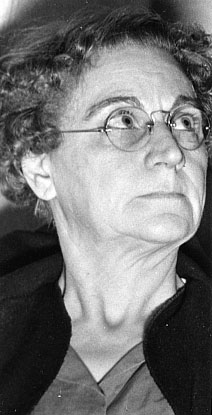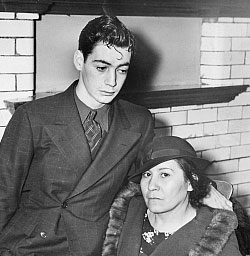
|
|
|
|
|
|
|
|
|
|
|

The following is excerpted from The California Snatch Racket: Kidnappings in the Prohibition and Depression Eras In no time at all, Harold and Irene identified Sena and Daly from mug shots. Consequently, they inadvertently revealed the three Baby Bandits' identity, and police grudgingly acknowledged that this fearful gang was tiny in number and short on age. After considerable questioning, they drove the couple in a police cruiser to the Bank of America. The kidnapper's did not keep their part of the bargain — Harold's automobile was nowhere in sight. They drove about the city for several hours hoping to spot the car or the bandits. It was hopeless.  Later that morning, anxious family members greeted Harold and Irene at the Oakland bus
terminal. While the weary kidnap victims were none the worse for the wear, they had come
to realize how lucky they were to return home unharmed.
Later that morning, anxious family members greeted Harold and Irene at the Oakland bus
terminal. While the weary kidnap victims were none the worse for the wear, they had come
to realize how lucky they were to return home unharmed.
Descriptions of the wanted teenagers circulated to every police agency in California. Duped for days by a trio of kids, the law enforcement community was in a sour mood. Subsequently, they issued an astonishing "shoot to kill" order. While the kidnapping played to its conclusion, yet another drama was set to open at Merced. When Olga Pla learned that her errant son Ernest was wanted in connection with the San Francisco tavern slaying, she sought to find him. Determined to "rescue" him from his "evil companions," she reasoned that he had holed up with friends in Merced, the former family home. Traveling more than a hundred miles to this small agricultural community in the San Joaquin Valley, the resolute mother set upon her task. Her effort succeeded when she found her son in the company of friends. As only a mother could, she pleaded with the boy to surrender. At last, he agreed. Spending money she could ill afford, Olga contacted San Francisco attorney Alexander Mooslin by long distance telephone. The lawyer listened to her story. Then he made his intentions known to San Francisco police detectives, and set out for Merced to connect with Olga's son. That afternoon, Mooslin accompanied Pla to the Merced police station where the boy surrendered to authorities. It was Mooslin's call that placed San Francisco Chief of Detectives Charles Dullea in Merced when the most dramatic chapter in the Baby Bandit saga unfolded. Dullea had gone to the police lockup to claim Pla when "all hell" broke loose. "We didn't know what was happening when we heard the sirens and saw all the excitement in the streets," he told a reporter for the Modesto Bee & News Herald. "We thought at first it was an accident." In another moment, Dullea heard gunfire and knew it was no accident. Unbeknownst even to Pla, Sena and Daly were in Merced. Acting on a tip, Merced Chief of Police Fred Zunker and Officer James Turner went across town to the Square Deal Café. At the bar were Sena and Daly drinking beer. Zunker sat down beside Sena. Turner stood behind Daly. "What is your name?" Zunker asked Sena. The young man handed him a stolen union card. "And what is your name?" Turner asked Daly. Daly was not inclined to answer. Instead, he reached into a shoulder holster for a pistol while Sena burst into action with flailing fists to keep the officers at bay. The Fresno Bee Republican takes up the story: "In the melee Daly backed toward the front door. Zunker leveled his gun at him but the officer's arm was struck by Sena. Daly gained the sidewalk just as Officer Turner opened fire. The first shot was placed at his feet, the second knee high. As the bandit ran, Turner fired two more shots but thought he had missed since Daly did not stagger." Daly ran around the corner of the café building, across an open lot and through a garage. Rather than give chase, Turner rushed back into the Square Deal where a fierce fight raged. Zunker and the bartender struggled mightily to subdue Sena. "Sap him!" hollered the chief. Turner's nightstick came down over the bandit's head — to no avail. With remarkable endurance, Sena continued to fight. Not until Turner had struck half a dozen blows did he immobilize the young man. After Sena was cuffed and in custody, all available Merced County sheriff's deputies and highway patrolmen were called into town to help track down Daly. Deputy Sheriff Rex McBride and Highway Patrol Captain William A Burch went to the garage in which Daly disappeared. From there they followed a trail of blood across two streets, through a lumberyard and the backyards of several homes. Then, at the Second Baptist Church, the blood trail ended. Through an opening in the side of the building, the two officers entered a crawl space beneath the church. McBride lit a match. What appeared to be a body lay at the opposite end of the structure partially obscured by a low cement retainer. The officers crawled on all fours until they reached the site. There they found Daly — dead. A bullet hole fringed by powder burns was visible in his head, and a pistol lay across his chest. Refusing capture, Daly shot himself to death. Sometime later, Charlotte Daly, the suicide's mother, said, "He won't get into anymore trouble now. After his release from the Preston School a short time ago, he told me he would never go back to a reformatory. He would kill himself first. It seems best that it is all over." The police transported Sena and Pla to San Francisco to await charges of first-degree murder. They held them on the heftiest bail ever fixed in the bay city — $l-million on multiple charges of armed robbery. Nevertheless, the staggering sum was a mere formality. There was no bail for a capital murder charge. Talkative, the teenagers confessed to ten armed robberies and admitted their participation in the killing of Daniel O'Connell. Not surprisingly, however, they named the dead Daly triggerman in the slaying. When the brash Sena was led to his cell, he asked officers, "When are you going to put a rope around my neck?" No rope was necessary. The next morning they found his body dangling by the neck from a pair of suspenders attached to the ceiling of his cell. Sena was dead. Just a few yards away, Pla slept soundly through the night.  "All my life and all my money have gone to keep my boy out of trouble," said Emma Crone, Sena's
mother. "Now it is all over and I don't care. Yes, I do care, I guess. But it has never been
any use."
"All my life and all my money have gone to keep my boy out of trouble," said Emma Crone, Sena's
mother. "Now it is all over and I don't care. Yes, I do care, I guess. But it has never been
any use."
As prosecutors eyed the gallows, Ernest Pla, sole survivor of the Baby Bandit triumvirate, turned contrite. Noting the suicides of his two companions, he told authorities he had no intention of "taking the easy way out." Then he begged for mercy. He would, he said, provide authorities with "all the information they asked for" to clear up robberies and other crimes. On March 1, Harold Nickle and Irene Bird, Baby Bandit kidnap victims, sent their parents telegrams announcing their elopement to Reno. The California press was uniform in its congratulations. Nothing was uniform about press reaction when newspapers learned that the prosecutors and Ernest Pla cut a deal with Superior Court Judge Sylvain J. Lazarus nodding his approval. In return for a guilty plea, they removed the potential for hanging Pla. There would be no trial. There would be no story for hungry reporters. The young man was sentenced to life in prison. "I am opposed to capital punishment," Lazarus told the press. "My own investigation of this case disclosed that the defendant was a victim of poor health, poverty in his family, and a weakness that caused him to succumb to the temptations of other young criminals." The kindly judge named Folsom Prison as the place of confinement. Pla bridled. He argued that San Quentin possessed better educational facilities. Impressed by the lad's apparent ambition to become a scholar of sorts, Lazarus dispatched the young man to the penitentiary of his choice — to live out his life. |
|
|
|
|
Copyright 2004-2013 by All rights reserved. |